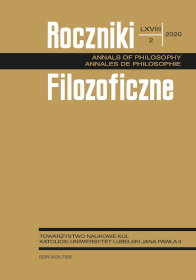The Fourth Meditation and Cartesian Circles
Abstract
We offer a novel interpretation of the argumentative role that Meditation IV plays within the whole of the Meditations. This new interpretation clarifies several otherwise head-scratching claims that Descartes makes about Meditation IV, and it fully exonerates the Fourth Meditation from either raising or exacerbating Descartes’ circularity problems.
References
Alanen, Lilli K. 1999. “Intuition, Assent and Necessity: The Question of Descartes’s Psychologism.” Acta Philosophica Fennica 64:99–121.
Alquié, Ferdinand. 1966. La découverte métaphysique de l’homme chez Descartes. 2nd ed. Paris: Presses Universitaires de France.
Augustine. 1993. On Free Choice of the Will. Translated by Thomas Williams. Indianapolis, IN: Hackett Publishing Company.
Carriero, John Peter. 2009. Between Two Worlds: A Reading of Descartes’s Meditations. Princeton: Princeton University Press.
Cress, Donald. 1994. “Truth, Error, and the Order of Reasons: Descartes’ Puzzling Synopsis of the Fourth Meditation.” In Reason, Will, and Sensation: Studies in Descartes’s Metaphysics, edited by John Cottingham. Oxford: Clarendon Press.
Della Rocca, Michael. 2006. “Judgment and Will.” In The Blackwell Companion to Descartes’ Meditations, edited by Stephen Gaukroger. Oxford: Blackwell.
Della Rocca, Michael. 2011. “Taking the Fourth: Steps toward a New (Old) Reading of Descartes.” Midwest Studies in Philosophy 35 (1): 93–110.
Dicker, Georges. 1993. Descartes: An Analytical and Historical Introduction. New York: Oxford University Press.
Fulmer, Everett, and C. P. Ragland. 2017. “Against the New Cartesian Circle.” Canadian Journal of Philosophy 47 (1): 66–74.
Hatfield, Gary. 2014. The Routledge Guidebook to Descartes’ Meditations. London and New York: Routledge.
Loeb, Louis E. 1990. “The Priority of Reason in Descartes.” Philosophical Review 99 (1): 3–43. Moyal, Georges J. 1996. “Magicians, Doubters and Perverts.” Revue Internationale de Philosophie 50 (195): 73–107.
Newman, Lex. 1999. “The Fourth Meditation.” Philosophy and Phenomenological Research 59 (3): 559–91.
Plantinga, Alvin. 1990. “God, Evil, and the Metaphysics of Freedom.” In The Problem of Evil, edited by Marilyn McCord Adams and Robert M. Adams, 83–109. Oxford: Oxford University Press.
Ragland, C. P. 2006. “Is Descartes a Libertarian?” In Oxford Studies in Early Modern Philosophy, edited by Daniel Garber and Steven M. Nadler, 3:57–90. Oxford: Oxford University Press.
Ragland, C. P. 2016. “The Will to Reason: Theodicy and Freedom in Descartes.” New York: Oxford University Press.
Wagner, Stephen I. 2014. Squaring the Circle in Descartes’ Meditations: The Strong Validation of Reason. Cambridge University Press.
Copyright (c) 2020 Roczniki Filozoficzne

This work is licensed under a Creative Commons Attribution-NonCommercial-NoDerivatives 4.0 International License.





